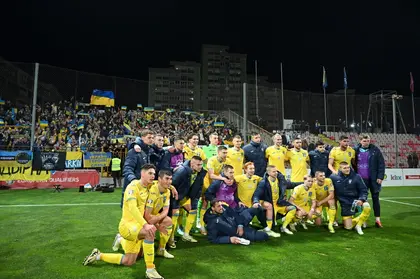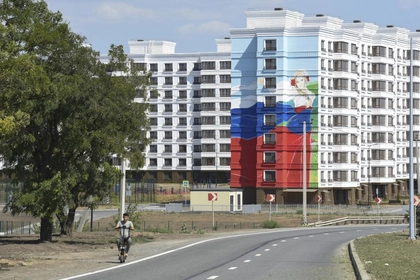On 21 March, twelve European national teams competed against one another in the qualification semi-finals took the first step towards booking their place in the 2024 European Championships. Separated into three groups of four, only three will secure the final qualification spots for this summer’s football competition. The six teams that one on Thursday have one more match to secure the chance to compete in Germany this summer.
Under normal circumstances, players will feel the pressure to deliver, secure qualification to the tournament and make their countries proud. Failure to qualify would be disappointing and some players would be distraught at missing out on European football’s largest and most prestigious competition.
JOIN US ON TELEGRAM
Follow our coverage of the war on the @Kyivpost_official.
But for Ukraine, the EURO qualification playoff matches have greater implications than just football. Ukraine’s national team members are not just playing for themselves, they carry the added load trying to boost the morale and spirits of a nation at war. Many have been affected by the ravages of war both since 2014 and, more recently by the full-scale 2022 invasion.
Ukraine traveled to Bosnia and Herzegovina for the playoff semi-final, on Thursday while Israel hosted Iceland in the other group game. Ukraine defeated Bosnia and Iceland beat Israel, so Ukraine will now host Iceland next Tuesday, the winner qualifying for the trip to Germany.

IMF Approves $1.1 Billion Loan Disbursement to Ukraine Before Trump Inauguration
The impact of the war on Ukrainian football
When Russia’s full-scale invasion began in February 2022, millions throughout Ukraine fled from Russian forces while thousands have died at the hands of Moscow’s brutality. Numerous cities, villages, and towns have been destroyed. One quarter of Ukraine’s total population is displaced, and there is no apparent end to the war.
Footballers, like all other Ukrainians, were impacted by Russia’s war. The 2021-2022 Ukrainian Premier League abruptly ended, with all football being suspended from February to July 2022. Numerous players at Ukrainian clubs worked with their managers to force a move away from the country. Several football stadiums were damaged or destroyed, and some Ukrainian clubs even went bankrupt, leaving dozens of athletes, club staff, and professionals without a job.
Meanwhile, it was determined by UEFA that the national team would have to play its international matches outside of Ukraine. The Ukrainians would still be able to travel abroad for their matches but matches hosted by the Ukrainians would either be played in Poland or Germany. Ukraine has not played a true home match in the national stadium since November 2021.
Eventually, domestic league football returned in August 2022, but matters have been challenging. Throughout the 2022-2023 season and the current 2023-2024 season, matches were disrupted and paused due to air raid sirens. Players and coaching staff were forced to flee to bomb shelters, seeking refuge, as Russia bombarded the country. To this day, fans and spectators are still not allowed to attend matches for fear of their safety – and the national team still plays outside of Ukraine.
The implications of the EURO qualifiers for Ukraine
Training to qualify for a major competition is stressful under normal circumstances but having sessions disrupted because of security concerns can only multiply the anxiety.
In addition to these physical challenges lies the mental strain. Many of these Ukrainian athletes have family and friends in areas that are constantly under threat of attack and others know individuals living under Russian occupation in the southern and eastern regions of Ukraine.
Ukraine vice-captain Taras Stepanenko, for example, has several family members living in the Donetsk region, in an area controlled by Russian forces. Meanwhile, Ukrainian fullback Oleksandr Karavayev has family in Kherson, a major city in southern Ukraine that was under Russian occupation for several months. During the Russian occupation, Karavayev discussed the hardships endured by his family and others in the region. Eventually, Ukrainian forces liberated the city, and Karavayev, as well as many other Ukrainians, expressed gratitude.
Some players, such as forward Roman Yaremchuk, rushed to help their families flee the Russian invasion. During the initial stages of the war, Ukraine captain Andriy Yarmolenko assisted Yarmechuk to help his family escape.
Ukrainian footballers, along with many other athletes, have found practical ways to help their country. Ukrainian clubs such as Dynamo Kyiv and Shakhtar Donetsk organized charity tours across Europe to raise hundreds of millions of euros to help rebuild Ukraine.
These are just a few examples out of a countless number of instances where Ukrainians have been impacted by the war. Despite these hardships, Ukrainian footballers are working hard to bring optimism and hope to their fellow Ukrainians during this immensely trying period of the country’s history. The national team’s recent successes during the EURO 2024 qualifiers gave Ukrainians something to cheer. If Ukraine qualifies for EURO 2024 proper by way of the playoffs, this would be celebrated nationwide as a tremendous accomplishment, given the current circumstances.
No one knows when the Russian invasion will end. Russia’s brutality continues to put many lives in jeopardy. But football, like many other cultural aspects of life, has helped temporarily shift the minds of Ukrainians from the barbarism they face with the prospect of competing in Germany being a small light in the darkness Ukrainians face.
Their national team will work hard to try to make it a reality and will strive to make its countrymen and women proud.
The views expressed in this opinion article are the author’s and not necessarily those of Kyiv Post.
Mark Temnycky is an accredited freelance journalist covering Eurasian affairs and a nonresident fellow at the Atlantic Council’s Eurasia Center. He can be found on X @MTemnycky
You can also highlight the text and press Ctrl + Enter






